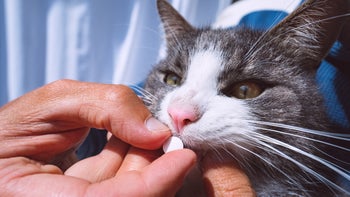
Lysine for Cats: A Supplement for Feline Herpesvirus Symptoms
Key takeaways:
Lysine (Enisyl-F, Felisyl, Incremin, Optixcare, Viralys) for cats is a nutritional supplement that is available over the counter.
Lysine may help with feline herpesvirus symptoms, including eye and upper respiratory infections in cats.
Some research suggests that lysine is effective for cats. But the majority of research says it does not ease symptoms of herpesvirus.
Table of contents

Lysine (Enisyl-F, Felisyl, Incremin, Optixcare, Viralys) is a natural supplement that may help manage symptoms of feline herpesvirus (FHV). FHV is a highly contagious, common viral infection in cats. Its symptoms include eye and upper respiratory infections.
Lysine has few negative side effects and is relatively inexpensive. This makes it worthwhile for pet parents to try and see if it manages their cat’s symptoms. Just keep in mind there's evidence it may not help cats.
In this article, we will discuss what lysine is, how it works in cats, and common side effects.
Search and compare options
Lysine for cats at a glance
Common names | Lysine (Enisyl-F, Felisyl, Optixcare, Viralys) |
What it treats | Eye and upper respiratory infections caused by herpesvirus |
How it comes (forms) | Powder, paste, tablet, chewable tablet, chews, flavored gel |
Dosage | 400 mg by mouth once a day |
Common side effects | Loss of appetite, soft stools |
Cost |
What is lysine for cats, and how does it work?
Lysine is an amino acid and a nutritional supplement that may help reduce FHV symptoms, such as eye infections in cats.
We don’t know exactly how lysine works to reduce symptoms. But it seems to interfere with arginine, another amino acid. Without lysine to counteract it, arginine reproduces the virus in cats. Keep in mind, your cat needs the right amount of arginine to stay healthy.
Lysine is sold over the counter and does not require a prescription. It’s considered off-label because it’s not approved by the FDA for use in cats.
What is lysine used for in cats?
Lysine is a dietary supplement that may help manage FHV symptoms. Herpesvirus is a highly contagious, incurable virus that is common in cats. The virus’ symptoms include:
Painful conjunctivitis that causes squinting
Eye discharge
Redness in the eyes
Loss of vision (in severe cases)
FHV can also cause upper respiratory infections with sneezing, nasal discharge, and in rare cases, skin ulcers.
Cat vaccines: What vaccines does your cat need? Check out this link to get the list of shots cats should get to prevent serious diseases.
Giving cats medication: It's not always easy getting your cat to take medication. Read how three real cat owners give their cats medication to pick up some new tips.
Is it time for a check-up? Cats should go to their veterinarian at least once a year for a check-up. Learn the many benefits of staying on top of your cat's preventive care.
Studies on the effectiveness of lysine to manage FHV symptoms showed mixed results. Some small studies concluded that lysine is effective. But many other studies suggested it’s not. This has led some veterinary experts to recommend against trying lysine, since it probably doesn't work. Ask your veterinarian about lysine for FHV before trying it in your cat.
How is lysine dosed and given to cats?
The standard dosage of lysine for cats is 400 mg by mouth once daily mixed in with a small amount of food. But a vet may recommend higher dosages given more often.
Lysine is available over the counter, and many veterinarians keep it in stock at their clinics. It comes in several forms, including:
A powder that can be mixed with food
Crushable tablets
Chewable tablets
Paste
Gel
Read more like this
Explore these related articles, suggested for readers like you.
If it works, lysine typically takes a few weeks to reach its full effects. But you may notice gradual improvements in your cat’s symptoms after a few days.
What are the common side effects of lysine in cats?
Research is mixed on potential side effects. Some research suggests cats may experience gastrointestinal side effects, including reduced appetite and soft stool. If your cat does have side effects, give lysine with food. Some cats may throw up if they swallow a large amount of lysine.
Give your cat lysine only if they tolerate it. If giving your cat lysine causes stress or loss of appetite, stop the medication and consult your veterinarian.
What are the most serious risks of lysine for cats?
There isn’t enough research to fully understand the serious risks of lysine for cats. But lysine may lower your cat's arginine levels. Researchers point out that lowering a cat’s arginine levels too much can cause problems.
Arginine is an important amino acid for your cat’s well-being. Because lysine may lower arginine, it could cause a condition called hyperammonemia. This is when there’s too much ammonia in your cat’s blood.
Symptoms of this life-threatening condition can include:
Lethargy
Circling
Head pressing
Blindness
Coma
Does lysine interact with other cat medications?
Lysine has few medication interactions. But use caution when the following medications and supplements are given at the same time as lysine:
Arginine (may interfere with lysine absorption)
Calcium supplements
Tell your veterinarian about all medications, vitamins, and supplements that your cat takes before giving them lysine.
What should you do if your cat misses a dose of lysine?
If you miss giving your cat a dose of lysine, give the next dose as soon as you remember. Then resume the regular dosing schedule the next day.
If it is close to the time of the next dose, skip the missed dose and give the next dose at the regular time. Never give 2 doses at the same time to catch up.
The bottom line
Lysine is a nutritional supplement that may help manage the symptoms of herpesvirus in cats. Veterinarians may recommend lysine because it’s relatively inexpensive and has a low incidence of negative side effects. But there's a lot of research that suggests lysine doesn't work to treat or prevent herpesvirus in cats.
Give your cat lysine once or twice daily, depending on your veterinarian’s guidance. Your cat’s eye and upper respiratory symptoms may ease in a few days. But it may take several weeks to notice the full effects of lysine if your works for your cat.
Why trust our experts?



References
Bol, S. (2015). Lysine supplementation is not effective for the prevention or treatment of feline herpesvirus 1 infection in cats: A systematic review. BMC Veterinary Research.
Gaby, A. R. (2006). Natural remedies for herpes simplex. Alternative Medicine Review.
International Cat Care. (2018). Feline HerpesVirus (FHV) infection.
Kuehn, N. F. (2018). Feline respiratory disease complex (feline viral rhinotracheitis, feline calicivirus). Merck Veterinary Manual.
Maggs, D. J., et al. (2003). Efficacy of oral supplementation with L-lysine in cats latently infected with feline herpesvirus. American Journal of Veterinary Research.
Niedziela, K. (2016). Lysine for FHV? Researchers say don’t bother. Veterinary Practice News.
Satchell, T. (2024). The ABCs of feline herpes. Canadian Animal Shelter & Community Medicine Association.
Stiles, J., et al. (2002). Effect of oral administration of L-lysine on conjunctivitis caused by feline herpesvirus in cats. American Journal of Veterinary Research.
Thomasy, S. M., et al. (2016). A review of antiviral drugs and other compounds with activity against feline herpesvirus type 1. Veterinary Ophthalmology.
Washizu, T. (2003). Diagnostic approach to hyperammonemic conditions in young dogs and cats. Veterinary Information Network.


























